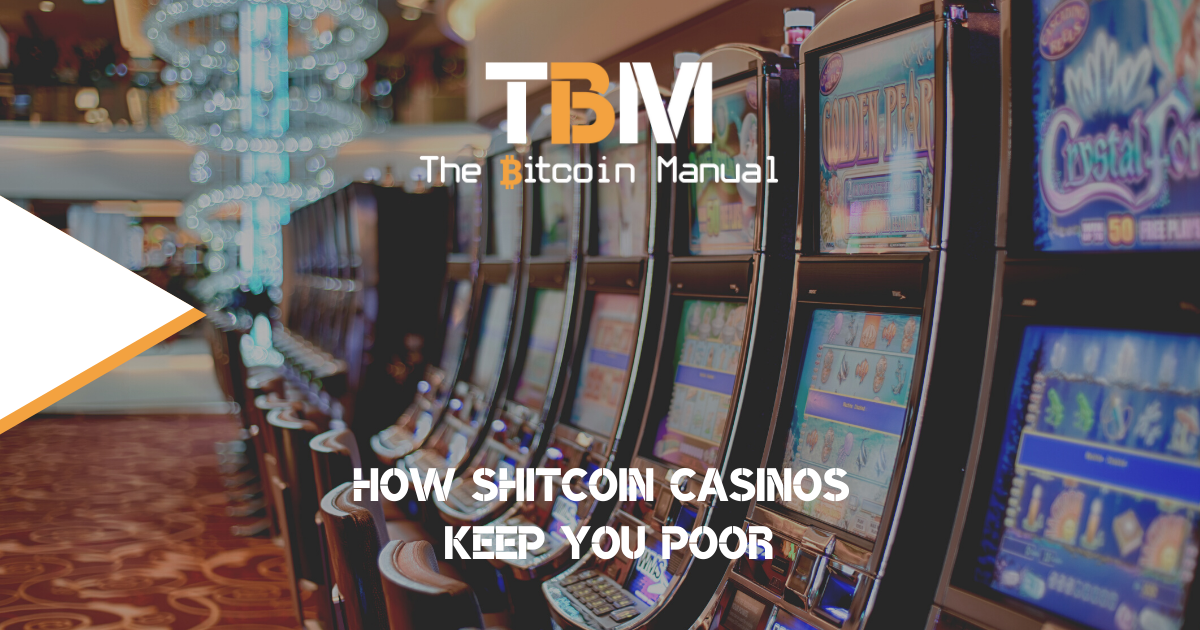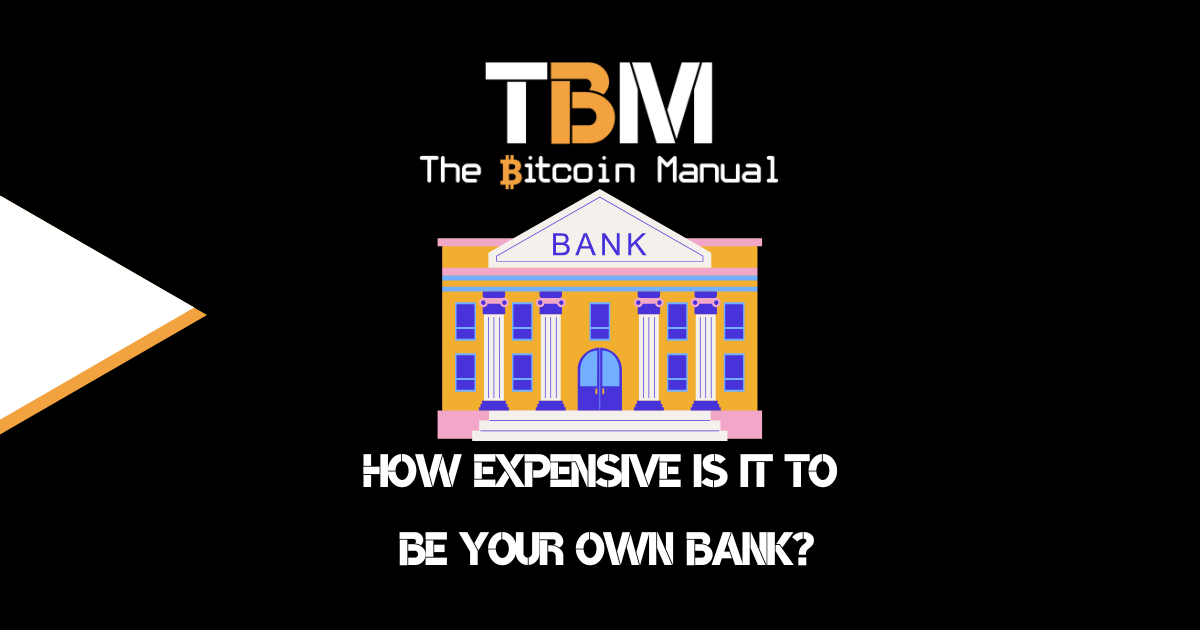When you get into the world of bitcoin, you may notice the nearly infinite amount of distractions and grifts trying to keep you from owning or holding onto bitcoin long term. Inflation in fiat may be rampant, but the inflation in ideas and projects to weasel bitcoin is growing even faster. As people seek shelter from currency debasement and want to protect their wealth, they are forced to deal with certain gatekeepers. Some refer to these gatekeepers as cryptocurrency exchanges, but this is simply a politically palatable term for shitcoin casinos. The crypto exchange is a necessary evil, your on-ramp to bitcoin, that will also test your resolve and conviction.
A test that many will fail and continue to fail at every day, a test I failed multiple times since starting my journey into bitcoin. The story is the same, you hear about bitcoin and want to own some, so you sign up for your local exchange to buy it. Your first purchase probably won’t be more than a few satoshis, and unit bias tends to hit pretty hard in the early days.
So your eyes start to wonder, you look at the other digital assets avialable that are “like bitcoin” and find some or other reason to diversify into different cryptocurrencies. It’s a tale as old as time and one of the primary methods these exchanges make more money. Exchanges rely on the grocery store model, you may enter for the foods that are necessary for you to live, but because it’s stored in a place with infinite distractions, you end up picking up sweets and candies that are no good for you.
An exchange’s business model benefits from you not building wealth; the more you trade, the larger your trades, the more time you spend on their site, the products you use, the more assets you buy, the better for them. The exchange business model is designed to keep you poor so that you can enrich their equity holders, think about it?
If you built any wealth, why would you continue to use their services? So they have to keep you from building wealth, so you constantly feel the need to use their services.
Shitcoin distractions
The first way in which exchanges earn money is through adding more shitcoins; the more “assets” they have to sell, the more trading pairs they can set up. The more trading pairs they set up, the more options for people to trade. These impressionable young traders see the constant creation of new markets as places to find opportunities when, in fact, they are only opportunities to generate more trading fees. The theory is the more assets avialable to trade, the more people you attract to trade, and they will trade more often.
Exchanges are incentivised to create new markets to attract traders with a low time preference. The more markets, the more chances of large spreads due to less arbitrage in a certain pair and bigger spreads. Additionally, the more trading pairs, the thinner liquidity is on these markets, and the more aggressive markets move.
When traders see this kind of volatility, they flock to these markets looking to try and capture those returns, of which very few do, but you can bet your arse they’ll try their best and lose money in the process.
Additionally, exchanges pocket huge listing fees from projects looking to gain access to the exchanges user base, so they’re not exactly going to care much for the quality of assets they list. The race here is to list as many assets as possible and pocket as much listing and trading fees as you can.
Rehypothecation of funds
When you add more asset support, you also make it more complex to manage portfolios. The more complex and diversified the trader’s portfolio, the less likely people want to take custody of those funds and prefer to leave it with the exchange instead. When you leave money on an exchange, it is an IOU, all you see is a balance on a screen, but those funds are not locked away in a specific vault waiting for you.
Oh no, like the bank’s exchanges put that money to work for them. They use it to provide liquidity for market makers; they loan that money out to traders for margin trades or use it to complete OTC transactions. The fact is your money is used to make their money, and you’re getting nothing out of the deal, so of course, they’re going to encourage you to leave funds with them.
Very few exchanges actually provide proof of reserves because the balances you see aren’t backed. They are rehypothecated funds, with the actual funds being used somewhere else. Exchanges like these simply keep a cash and digital asset float available to cover withdrawals each day, while the rest of the funds are used for different financial plays
Exchanges create more products and sell you more risk
As an exchange user, you are the product, the more trades and mistakes you make, the better for the exchange. To help encourage more trading, bigger trading sizes, taking on more risk or even leaving your funds with them a little longer, exchanges create new products.
We’ve seen exchanges launch products like:
- Futures contracts
- Liquidity pools
- Interest accounts
- Margin trading
- Options trading
All of these products are designed to encourage you to trade more, diversify your portfolio away from bitcoin get you to take on more risk so you can get cleaned out.
Fees from trading
Exchanges make large sums of consistent funds through trading fees; this could be fees on funding your account, withdrawing your account, trading certain pairs or using certain products like borrowing on margin. These fees may seem negligible to you, but when you scale that up to thousands of trades each day, it adds up to millions if not billions in revenue each year.
To keep that gravy train going, these exchanges need to find ways to encourage you to keep trading. As someone who only buys to self custody and hodl, there is very little opportunity to hit me with fees. However, if I am a trader or hold multiple assets, there is always a way for exchanges to get an extra fee out of you.
Fees for withdrawals
Fees from withdrawals are probably one of the biggest annoyances with exchanges. When it comes to bitcoin, naturally, there are mining fees involved when taking custody of your bitcoin, so exchanges and users will limit their interaction with the chain. Exchanges will also put up certain limits that you need to hit before withdrawing, keeping you in their ecosystem longer.
My issue is this can all be remedied by adding liquid network and lightning network support for smaller deposits and withdrawals. The technology exists and continues to improve, yet many exchanges ignore it.
Why?
It hits their bottom line, of course; instead of providing their customers with an improved experience, they would rather focus on keeping your funds. These are funds they can use to trade or borrow ti other traders on margin.
By reducing your options to take custody of your funds, they also encourage you to come back to their service where they can sell you on one of their new products. Exchanges know they can eventually break down your resolve and get you to trade if they can maintain custody of your funds long enough.
Finally, exchanges don’t want to offer cheaper withdrawals because it impacts liquidity on their exchange; if more people are removing funds, it will be harder for them to maintain liquidity for all the shitcoin pairs they have listed. They would need to either offer higher interest rates to attract liquidity, and that would impact their margin.
Exchanges rely on you never taking custody of your funds so they can profit. If you see an exchange that doesn’t support liquid or lightning but hosts shitcoins, then that, my friend, is a shitcoin casino.
Market making
If you were an exchange and you had all the data on your traders, and you had the funds to move your internal market in a direction that benefits you, why would you not? It may be an in-house market marker or a third party service that leverages the funds of the exchange to trade on their behalf. The fact is these expert traders, with their access to data from the matching engines and ability to craft algorithms, are there to pouch click traders money.
Like a casino, these exchanges will let you win once in a while, but the end goal is to either bleed you dry through products and fees. If they can, they’ll also take your money through trading against their customer base.
Exchanges benefit from fewer bitcoiners
If most people who signed up to exchanges loaded it up with local currency to purchase bitcoin and remove it from digital asset exchanges, that would leave minimal options for revenue. These exchanges, like most businesses these days, don’t want to work hard for their money. So instead of finding ways to better leverage bitcoin, they turn to financial engineering because it requires less creativity but provide more opportunities to collect fees.
As more exchanges come online, they provide more competition, and when you’re all selling the same product, bitcoin, you can only compete on fees. The lower your fees, the more users you need to acquire and the more frequent their trades, a ruthless business. One misstep and you lose your client base, and you’re toast.
Selling a product with shrinking margins means exchanges who want to expand need to find ways to keep you from becoming bitcoin only. The lack of profit in selling bitcoin to the public is why exchanges actively promote products and services I’ve mentioned in this post, to try and get you to trade more often, to try out different products, to chase more returns and to leave your money with them.
I am not saying exchanges are evil; they focus on generating profit like any business. What I am saying is you, as the consumer, need to think critically about the product range they provide and if these products benefit you. Take a critical look at the kinds of behaviour exchanges to encourage and why they do that because it is profitable.
As a bitcoiner, you shouldn’t be playing into the hands of others profit motives but focus on profits for yourself. You’re already taxed to death under a fiat regime. Why would you want more of it, with a different name? Exchanges offer a bridging environment between fiat and bitcoin. Still, they are encouraging you to remain on the bridge, and instead of crossing over, they want you to make multiple trips back and forth or even sideways.
If you want to support big business and venture capital with your income, that’s your right to do so. You’re not ready to take ownership of your financial future, and you want to gamble. If you want to be a degenerate trader trying to YOLO your way to short term paydays, by all means, don’t let anyone stop you. Your losses are a hodlers gains, so keep rewarding hodlers for their conviction; you’ll soon end up becoming on yourself.




